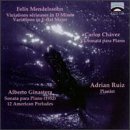| All Artists: Adrian Ruiz, Alberto Ginastera, Felix Mendelssohn, Carlos Chavez Title: Mendelssohn: Variations; Carlos Ch�vez: Sonata para Piano; Alberto Ginastera: Sonata para Piano; 12 American Preludes Members Wishing: 0 Total Copies: 0 Label: Genesis Records Release Date: 8/18/1998 Genre: Classical Styles: Chamber Music, Forms & Genres, Sonatas, Historical Periods, Classical (c.1770-1830), Modern, 20th, & 21st Century Number of Discs: 1 SwapaCD Credits: 1 UPC: 009414811424 |
Search - Adrian Ruiz, Alberto Ginastera, Felix Mendelssohn :: Mendelssohn: Variations; Carlos Ch�vez: Sonata para Piano; Alberto Ginastera: Sonata para Piano; 12 American Preludes
CD Details |
CD ReviewsA COMBINATION OF CANNY CONTRASTS! Melvyn M. Sobel | Freeport (Long Island), New York | 08/21/2001 (5 out of 5 stars) "As averse as I am to most compilation CDs flooding the market today--- and I use the word "averse" advisedly--- this 1998 Genesis release, culled and integrated from two separate LPs of 1971 and 1973 derivation, is so blatantly outrageous in its combination of seemingly dissimilar composers and compositions that it unnervingly, and unexpectedly, in a world of musical normality, becomes exactly what it should NOT: A recording that is so perfect in its apparent illogic, which, as you will see, is completely logical, that it simply MUST be heard. In essence, almost comically, it makes perfect sense. Cryptic observations aside, however, explanations are in order.Most of us are familiar with the twentieth century Mexican composer, Carlos Chavez (1899-1978), through his popular symphonies, not his chamber works, and certainly not his piano music. I was one of the multitude (who lived in ignorance)--- until I played his VI Sonata for Piano, wherein this modern neo-classicist tries his hand at rendering a piano sonata in a truly "classical" mimicry, succeeds brilliantly--- and on his own technical terms. Had I not known beforehand that this was Chavez, I would have been entirely confounded attempting to determine the actual composer, and I would have been appallingly inept. So perfectly on target is Chavez, so ingenious in his composition, that this three-movement "classical" sonata is a perfect synthesis of Haydn, Mozart and Beethoven. It's sheer delight, from beginning to end, tickles the musical intellect. So unique is the Sonata No. 6 that despite its running time of twenty-three minutes, it is worth the price of the CD. It's THAT clever!OK. With the inclusion of Mendelssohn's variations (Opp. 54 and 82), suddenly Producer Commagere's modus operandus becomes clear, the conception, brilliant. As a perfect "progression" from the Classical period, Mendelssohn (1809-1847), one of the pinnacles of the Romantic movement, is an apt candidate. Coming on the heels of the Chavez VI Sonata, Felix's "Variations Serieuses" in D Minor adds just the right sequential "weight," at almost twelve minutes; and, then, his E-Flat Variations lightens the atmosphere and primes us for twenty-seven minutes of early Argentinian modernism.And off we go, in a whirl, with Alberto Ginastera (1916-1983) and his 12 American Preludes for Piano, Op. 12! How prescient even the first of the Preludes, "Accents," is, and how impossible it seems that its first notes appear an absolute continuation of the previous Op. 82 Variations of Mendelssohn--- but a Mendelssohn on steroids, of course. Utterly fascinating! The Ginastera Preludes (1944), timing in at a little over thirteen minutes, are all short works that explore the composer's technical and creative prowess, his rhythmic drive and coloration of mood. Among the most affecting are No. 7 ("Sadness"), No. 10 ("In the First Pentatonic Minor Mode"), No. 13 ("Hommage to Juan Jose Castro") and No. 15 ("Pastorale").It's all about musical contrasts. And this is the point.So, then, from "classical" Chavez, to "romantic" Mendelssohn, through an early, experimental Ginastera, we enter the "new" world of this composer, some eight years later, with his Sonata for Piano (1952)--- THE Ginastera Piano Sonata--- and his unabashed modernism in full flower, thrilling in its Prokofiev-like dissonances and sonorities (Allegro), its repetitions and oblique rhythms (Presto), its loosely-hinged undercurrents of an insistent "other-worldliness" (Adagio) and its brief, but relentless, locomotive drive (Ruvido ed Ostinato finale). Although only a bit short of fourteen minutes, the Ginastera Sonata is an exacting composition of the most brutal strength and curiously intimate moments of vulnerability. Not one note can be added or subtracted; it is as pure a distillation of energy versus inertia that can be imagined.Pianist Adrian Ruiz, a formidable talent in everything he tackles, is nothing less than awe-inspiring in the Ginastera, his massive technique, electrifying, his emotional sublimation, explosive. And, yet, in the Chavez and Mendelssohn he "adjusts" to suit each work at hand, which, to me, seems even more impressive, and he plays them with a wonderful sensitivity.Consequently, by the time we arrive at the conclusion of this CD, we have literally circumnavigated a pre-ordained musical "world," a world of contrasts established specifically to open our eyes anew. As I initially said, the combination of these varied composers "seemed" outrageous; however, the "manipulation" works. It all fits perfectly and logically. And there's the point... and the beauty. I scoffed, denied---simply by judging this CD by its contents--- before listening. Looks are very much deceiving. This, most assuredly, is a recording not to be missed.Inevitably, it's time for me, again, to eat a little crow.[Running time: 69:15]"
|


 Track Listings (21) - Disc #1
Track Listings (21) - Disc #1